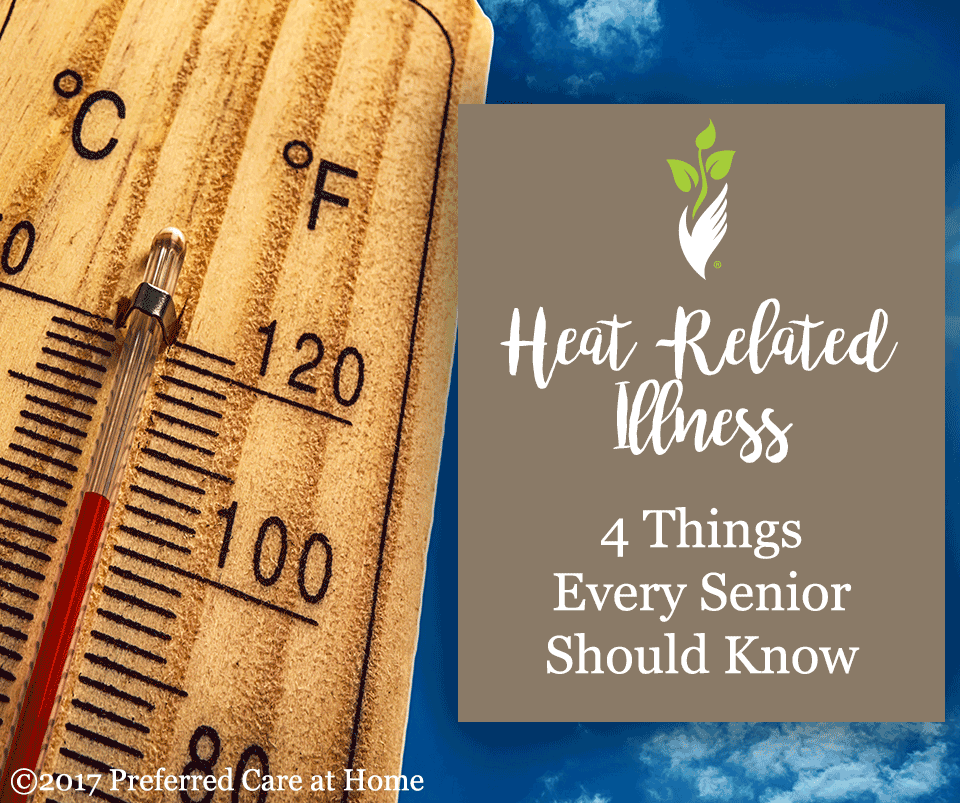Heat-Related Illness: 4 Things Every Senior Should Know
Published May 23, 2017 by R. Bradley Robinson, M.D. in Senior Health & Wellness, Senior Safety

As we all begin to prepare for warm temperatures this summer, it is critical to recognize the importance of heat safety in preventing heat-related illnesses.
If you tune into the daily news, you are probably aware of the strange weather paradox we experienced in the US last week. Millions of Americans in the Northeast experienced a heat wave that produced higher temperatures in Boston and New York than those in Arizona and Florida. As we all begin to prepare for warm temperatures this summer, it is critical to recognize the importance of heat safety in preventing heat-related illnesses. Before you head to the lake or pack up the car for the beach vacation this summer, take a moment and ensure that your senior loved ones are prepared to handle whatever temperatures mother nature may have in store. Here are four things you should know about heat-related illness.
1. Seniors Are at Increased Risk for Heat-Related Illness
The first step to protect against heat illness is to recognize that it is a particular risk for seniors. This is especially true of those who have impaired mobility and who lack a strong social network. Inadequate air conditioning units may need to be repaired or window ac units installed in regions that do not typically have high temperatures. These tasks are physically intensive and most seniors will require help. In addition to family and friends checking in during a heat wave to, the phone numbers of a service technician or handyman should be clearly posted in a visible area such as a refrigerator.
2. Medications May Increase the Risk of Overheating
Some of the most widely-prescribed medications for seniors can have a side effect of increasing the risk for hyperthermia (i.e. overheating). This includes heart and blood pressure medications like beta-blockers, over-the-counter cold medications such as antihistamines, as well as some antidepressant medications. I want to clearly state that you should never stop taking a prescribed medication without first consulting with your doctor. However, if you are taking one of these medications, it is even more important to avoid hot temperatures for long periods of time and to stay hydrated during heat waves.
3. Complications of Heat Illness Can Be Life-Threatening
Heat stroke occurs when the core body temperature reaches above 104℉ in combination with central nervous system dysfunction, such as altered mental status, dizziness, or seizures. This condition can also lead to injury to the muscles (rhabdomyolysis), kidneys, and liver. Severe cases can progress to multisystem organ failure and blood clotting disorders, which may lead to death. While the prognosis is extremely good when recognized and treated early, a delay in diagnosis or treatment can lead to the most serious of complications.
4. Prepare Now for a Natural Disaster
Most seniors with an adequate air conditioner do not face the risk of heat illness on a daily basis, even during a summer blaze. However, this can all change in the blink of an eye when a natural disaster such as a hurricane or tornado strike. In addition to developing a plan to stay safe during the storm, it is just as important to have a disaster plan for the days after. Power lines and other infrastructure may be down for days to weeks, which impact not only the ability to stay cool but also access to clean water and refrigerated medications. If you need help developing a natural disaster plan, you can read this article or give us a call and let us help you in person.
By paying attention to the weather outside and ensuring that those we love have the resources they need, together we can take an important step toward protecting every senior from the dangers of heat-related illness. Wherever your summer travels take you this year, I hope you have fun, stay safe, and stay cool.
If you have questions about senior home
care services or if you want to start care:
Related Posts

January 27, 2025
Is There a Food Allowance Card for Seniors?
Jody Guerrieri, RN.

January 27, 2025
What Causes Glassy Eyes in the Elderly?
Jody Guerrieri, RN.

January 27, 2025
What Age Is Considered a Senior Citizen?
Jody Guerrieri, RN.
Helping seniors age in place, with dignity & grace.